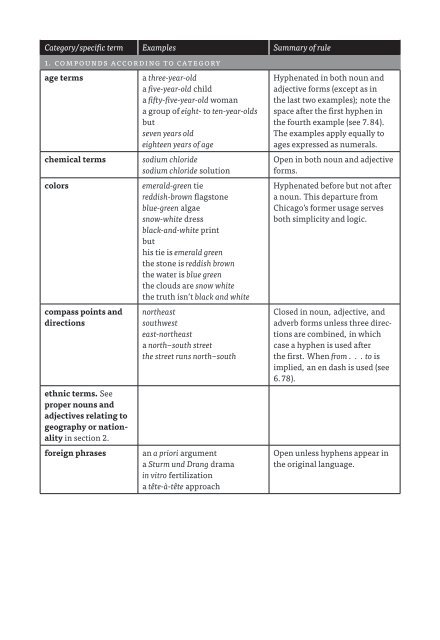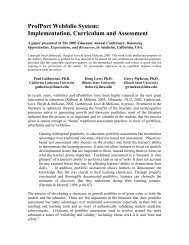The Chicago Manual of Style Online: Hyphenation Table - Educause
The Chicago Manual of Style Online: Hyphenation Table - Educause
The Chicago Manual of Style Online: Hyphenation Table - Educause
You also want an ePaper? Increase the reach of your titles
YUMPU automatically turns print PDFs into web optimized ePapers that Google loves.
agree with Webster’s . (Compounds formed with suffi xes—e.g., nationhood<br />
, penniless —are almost always closed.)<br />
Category/specifi c term Examples Summary <strong>of</strong> rule<br />
1. compounds according to category<br />
age terms a three- year- old<br />
a fi ve- year- old child<br />
a fi fty- fi ve- year- old woman<br />
a group <strong>of</strong> eight- to ten- year- olds<br />
but<br />
seven years old<br />
eighteen years <strong>of</strong> age<br />
chemical terms sodium chloride<br />
sodium chloride solution<br />
colors emerald- green tie<br />
reddish- brown fl agstone<br />
blue- green algae<br />
snow- white dress<br />
black- and- white print<br />
but<br />
his tie is emerald green<br />
the stone is reddish brown<br />
the water is blue green<br />
the clouds are snow white<br />
the truth isn’t black and white<br />
compass points and<br />
directions<br />
northeast<br />
southwest<br />
east- northeast<br />
a north–south street<br />
the street runs north–south<br />
ethnic terms. See<br />
proper nouns and<br />
adjectives relating to<br />
geography or nationality<br />
in section 2.<br />
foreign phrases an a priori argument<br />
a Sturm und Drang drama<br />
in vitro fertilization<br />
a tête- à- tête approach<br />
Hyphenated in both noun and<br />
adjective forms (except as in<br />
the last two examples); note the<br />
space after the fi rst hyphen in<br />
the fourth example (see 7.84 ).<br />
<strong>The</strong> examples apply equally to<br />
ages expressed as numerals.<br />
Open in both noun and adjective<br />
forms.<br />
Hyphenated before but not after<br />
a noun. This departure from<br />
<strong>Chicago</strong>’s former usage serves<br />
both simplicity and logic.<br />
Closed in noun, adjective, and<br />
adverb forms unless three directions<br />
are combined, in which<br />
case a hyphen is used after<br />
the fi rst. When from . . . to is<br />
implied, an en dash is used (see<br />
6.78 ).<br />
Open unless hyphens appear in<br />
the original language.<br />
pro<strong>of</strong>s for review only<br />
cmos16_ch7.indd 375 5/14/10 1:5<br />
375
7.85 spelling, distinctive treatment <strong>of</strong> words, and compounds<br />
Category/specifi c term Examples Summary <strong>of</strong> rule<br />
1. compounds according to category (continued)<br />
fractions, compounds<br />
formed with<br />
376<br />
a half hour<br />
a half- hour session<br />
a quarter mile<br />
a quarter- mile run<br />
an eighth note<br />
fractions, simple one- half<br />
two- thirds<br />
three- quarters<br />
one twenty- fi fth<br />
one and three- quarters<br />
a two- thirds majority<br />
three- quarters done<br />
a one twenty- fi fth share<br />
number +<br />
abbreviation<br />
the 33 m distance<br />
a 2 kg weight<br />
a 3 ft. high wall<br />
number + noun a hundred- meter race<br />
a 250- page book<br />
a fi fty- year project<br />
a three- inch- high statuette<br />
it’s three inches high<br />
a one- and- a- half- inch hem<br />
one and a half inches<br />
a fi ve- foot- ten quarterback<br />
fi ve feet ten [inches tall]<br />
fi ve- to ten- minute intervals<br />
number + percentage 50 percent<br />
a 10 percent raise<br />
number, ordinal, +<br />
noun<br />
number, ordinal, +<br />
super lative<br />
on the third fl oor<br />
third- fl oor apartment<br />
103rd- fl oor view<br />
fi fth- place contestant<br />
twenty- fi rst- row seats<br />
a second- best decision<br />
third- largest town<br />
fourth- to- last contestant<br />
he arrived fourth to last<br />
numbers, spelled out twenty- eight<br />
three hundred<br />
nineteen forty- fi ve<br />
fi ve hundred fi fty<br />
relationships. See<br />
foster, grand, in- law,<br />
and step in section 3.<br />
Noun form open; adjective form<br />
hyphenated. See also numbers<br />
in this section and half in section<br />
3.<br />
Hyphenated in noun, adjective,<br />
and adverb forms, except<br />
when second element is already<br />
hyphenated. See also number +<br />
noun and 9.14 .<br />
Always open. See also number<br />
+ noun.<br />
Hyphenated before a noun,<br />
otherwise open. Note the space<br />
after the fi rst number in the last<br />
example. See also number +<br />
abbreviation. See also 9.13 .<br />
Both noun and adjective forms<br />
always open.<br />
Adjective form hyphenated before<br />
a noun, otherwise open. See<br />
also century in section 3.<br />
Hyphenated before a noun,<br />
otherwise open.<br />
Twenty- one through ninety- nine<br />
hyphenated; others open. See<br />
also fractions, simple.
Category/specifi c term Examples Summary <strong>of</strong> rule<br />
1. compounds according to category (continued)<br />
time at three thirty<br />
the three- thirty train<br />
a four o’clock train<br />
the 5:00 p.m. news<br />
2. compounds according to parts <strong>of</strong> speech<br />
adjective + noun small- state senators<br />
a high- quality alkylate<br />
a middle- class neighborhood<br />
the neighborhood is middle class<br />
adjective + participle tight- lipped person<br />
high- jumping grasshoppers<br />
open- ended question<br />
the question was open ended<br />
adverb ending in ly +<br />
participle or adjective<br />
adverb not ending<br />
in ly + participle or<br />
adjective<br />
a highly paid ragpicker<br />
a fully open society<br />
he was mildly amusing<br />
a much- needed addition<br />
it was much needed<br />
a very well- read child<br />
little- understood rules<br />
a too- easy answer<br />
the best- known author<br />
the highest- ranking <strong>of</strong>fi cer<br />
the worst- paid job<br />
a lesser- paid colleague<br />
the most effi cient method<br />
a less prolifi c artist<br />
a more thorough exam<br />
the most skilled workers (most in<br />
number)<br />
but<br />
the most- skilled workers (most<br />
in skill)<br />
a very much needed addition<br />
combining forms electrocardiogram<br />
socioeconomic<br />
politico- scientifi c studies<br />
the practico- inert<br />
gerund + noun running shoes<br />
cooking class<br />
running- shoe store<br />
noun + adjective computer- literate accountants<br />
HIV- positive men<br />
the stadium is fan friendly<br />
she is HIV positive<br />
Compounds and <strong>Hyphenation</strong> 7.85<br />
Usually open; forms such as<br />
“three thirty,” “four twenty,”<br />
etc., are hyphenated before the<br />
noun.<br />
Hyphenated before but not after<br />
a noun.<br />
Hyphenated before but not after<br />
a noun.<br />
Open whether before or after a<br />
noun.<br />
Hyphenated before but not after<br />
a noun; compounds with more,<br />
most, less, least, and very usually<br />
open unless ambiguity threatens.<br />
When the adverb rather<br />
than the compound as a whole is<br />
modifi ed by another adverb, the<br />
entire expression is open.<br />
Usually closed if permanent,<br />
hyphenated if temporary. See<br />
7.78 .<br />
Noun form open; adjective form<br />
hyphenated. See also noun +<br />
gerund.<br />
Hyphenated before a noun; usually<br />
open after a noun.<br />
377
7.85 spelling, distinctive treatment <strong>of</strong> words, and compounds<br />
Category/specifi c term Examples Summary <strong>of</strong> rule<br />
2. compounds according to parts <strong>of</strong> speech (continued)<br />
noun + gerund decision making<br />
a decision- making body<br />
mountain climbing<br />
time- clock- punching employees<br />
a Nobel Prize–winning chemist<br />
(see 6.80 )<br />
bookkeeping<br />
caregiving<br />
copyediting<br />
noun + noun, single<br />
function (fi rst noun<br />
modifi es second<br />
noun)<br />
noun + noun, two<br />
functions (both nouns<br />
equal)<br />
noun + numeral or<br />
enumerator<br />
378<br />
student nurse<br />
restaurant owner<br />
directory path<br />
tenure track<br />
tenure- track position<br />
home- rule governance<br />
shipbuilder<br />
gunrunner<br />
copyeditor<br />
nurse- practitioner<br />
philosopher- king<br />
city- state<br />
city- state governance<br />
type A<br />
a type A executive<br />
type 2 diabetes<br />
size 12 slacks<br />
a page 1 headline<br />
noun + participle a Wagner- burdened repertoire<br />
fl ower- fi lled garden<br />
a clothes- buying grandmother<br />
a day <strong>of</strong> clothes buying<br />
participle + noun chopped- liver pâté<br />
cutting- edge methods<br />
their approach was cutting edge<br />
participle + up, out,<br />
and similar adverbs<br />
dressed- up children<br />
burned- out buildings<br />
ironed- on decal<br />
we were dressed up<br />
that decal is ironed on<br />
phrases, adjectival an over- the- counter drug<br />
a matter- <strong>of</strong>- fact reply<br />
an up- to- date solution<br />
sold over the counter<br />
her tone was matter <strong>of</strong> fact<br />
his equipment was up to date<br />
Noun form usually open; adjective<br />
form hyphenated before a<br />
noun. Some permanent compounds<br />
closed (see 7.78 ).<br />
Noun form open; adjective form<br />
hyphenated before a noun. Some<br />
permanent compounds closed<br />
(see 7.78 ).<br />
Both noun and adjective forms<br />
always hyphenated.<br />
Both noun and adjective forms<br />
always open.<br />
Hyphenated before a noun,<br />
otherwise open.<br />
Adjective form hyphenated<br />
before but not after a noun.<br />
Adjective form hyphenated<br />
before but not after a noun. Verb<br />
form always open.<br />
Hyphenated before a noun; usually<br />
open after a noun.
Category/specifi c term Examples Summary <strong>of</strong> rule<br />
2. compounds according to parts <strong>of</strong> speech (continued)<br />
phrases, noun stick- in- the- mud<br />
jack- <strong>of</strong>- all- trades<br />
a fl ash in the pan<br />
proper nouns and<br />
adjectives relating to<br />
geography or nationality<br />
African Americans<br />
African American president<br />
a Chinese American<br />
French Canadians<br />
South Asian Americans<br />
the Scotch Irish<br />
the North Central region<br />
Middle Eastern countries<br />
but<br />
Sino- Tibetan languages<br />
the Franco- Prussian War<br />
the US- Canada border<br />
Anglo- American cooperation<br />
Anglo- Americans<br />
3. compounds formed with specific terms<br />
ache toothache<br />
stomachache<br />
all all out<br />
all along<br />
all over<br />
an all- out eff ort<br />
an all- American player<br />
the book is all- encompassing<br />
but<br />
we were all in [tired]<br />
book reference book<br />
coupon book<br />
checkbook<br />
cookbook<br />
borne waterborne<br />
food- borne<br />
e- mail- borne<br />
mosquito- borne<br />
century the twenty- fi rst century<br />
fourteenth- century monastery<br />
twenty- fi rst- century history<br />
a mid- eighteenth- century poet<br />
late nineteenth- century politicians<br />
her style was nineteenth century<br />
Compounds and <strong>Hyphenation</strong> 7.85<br />
Hyphenated or open as listed in<br />
Webster’s. If not in the dictionary,<br />
open.<br />
Open in both noun and adjective<br />
forms, unless the fi rst term is<br />
a prefi x or unless between is<br />
implied. See also 8.38 .<br />
Always closed.<br />
Adverbial phrases open; adjectival<br />
phrases usually hyphenated<br />
both before and after a noun.<br />
Closed or open as listed in<br />
Webster’s. If not in the dictionary,<br />
open.<br />
Closed if listed as such in<br />
Webster’s. If not in Webster’s,<br />
hyphenated; compounds retain<br />
the hyphen both before and after<br />
a noun.<br />
Noun forms always open; adjectival<br />
compounds hyphenated<br />
before but not after a noun. See<br />
also old (below), mid (in section<br />
4), and 7.83 .<br />
379
7.85 spelling, distinctive treatment <strong>of</strong> words, and compounds<br />
Category/specifi c term Examples Summary <strong>of</strong> rule<br />
3. compounds formed with specific terms (continued)<br />
cross a cross section<br />
a cross- reference<br />
cross- referenced<br />
cross- grained<br />
cross- country<br />
crossbow<br />
crossover<br />
e e- mail<br />
e- book<br />
eBay<br />
elect president- elect<br />
vice president elect<br />
mayor- elect<br />
county assessor elect<br />
ever ever- ready help<br />
ever- recurring problem<br />
everlasting<br />
he was ever eager<br />
ex ex- partner<br />
ex- marine<br />
ex–corporate executive<br />
foster foster mother<br />
foster parents<br />
a foster- family background<br />
free toll- free number<br />
accident- free driver<br />
the number is toll- free<br />
the driver is accident- free<br />
full full- length mirror<br />
the mirror is full length<br />
three bags full<br />
a suitcase full<br />
general attorney general<br />
postmaster general<br />
lieutenants general<br />
grand, great- grand grandfather<br />
granddaughter<br />
great- grandmother<br />
great- great- grandson<br />
380<br />
Many compounds formed with<br />
cross are in Webster’s (as those<br />
listed here). If not in Webster’s,<br />
noun, adjective, adverb, and<br />
verb forms should be open.<br />
Hyphenated except with proper<br />
nouns. See also 8.163 .<br />
Hyphenated unless the name<br />
<strong>of</strong> the <strong>of</strong>fi ce consists <strong>of</strong> an open<br />
compound.<br />
Usually hyphenated before but<br />
not after a noun; some permanent<br />
compounds closed.<br />
Hyphenated, but use en dash if<br />
ex- precedes an open compound.<br />
Noun forms open; adjective<br />
forms hyphenated.<br />
Compounds formed with free as<br />
second element are hyphenated<br />
both before and after a noun.<br />
Hyphenated before a noun,<br />
otherwise open. Use ful only in<br />
such permanent compounds as<br />
cupful, handful.<br />
Always open; in plural forms,<br />
general remains singular.<br />
Grand compounds closed; great<br />
compounds hyphenated.
Category/specifi c term Examples Summary <strong>of</strong> rule<br />
3. compounds formed with specific terms (continued)<br />
half half- asleep<br />
half- fi nished<br />
a half sister<br />
a half hour<br />
a half- hour session<br />
halfway<br />
halfh earted<br />
house schoolhouse<br />
courthouse<br />
safe house<br />
rest house<br />
in- law sister- in- law<br />
parents- in- law<br />
like catlike<br />
childlike<br />
Christlike<br />
bell- like<br />
a penitentiary- like institution<br />
mid. See section 4.<br />
near in the near term<br />
a near accident<br />
a near- term proposal<br />
a near- dead language<br />
odd a hundred- odd manuscripts<br />
350- odd books<br />
old a three- year- old<br />
a 105- year- old woman<br />
a decade- old union<br />
a centuries- old debate<br />
a child who is three years old<br />
the debate is centuries old<br />
on online<br />
onstage<br />
ongoing<br />
on- screen<br />
on- site<br />
percent 5 percent<br />
a 10 percent increase<br />
Compounds and <strong>Hyphenation</strong> 7.85<br />
Adjective forms hyphenated<br />
before and after the noun; noun<br />
forms open. Some permanent<br />
compounds closed, whether<br />
nouns, adjectives, or adverbs.<br />
Check Webster’s. See also fractions<br />
in section 1.<br />
Closed or open as listed in<br />
Webster’s. If not in the dictionary,<br />
open.<br />
All compounds hyphenated;<br />
only the fi rst element takes a<br />
plural form.<br />
Closed if listed as such in<br />
Webster’s. If not in Webster’s,<br />
hyphenated; compounds retain<br />
the hyphen both before and after<br />
a noun.<br />
Noun forms open; adjective<br />
forms hyphenated.<br />
Always hyphenated.<br />
Noun forms hyphenated. Adjective<br />
forms hyphenated before a<br />
noun, open after. See also age<br />
terms in section 1.<br />
Sometimes closed, sometimes<br />
hyphenated. Check Webster’s and<br />
hyphenate if term is not listed.<br />
See also 7.79 .<br />
Both noun and adjective forms<br />
always open.<br />
381
7.85 spelling, distinctive treatment <strong>of</strong> words, and compounds<br />
Category/specifi c term Examples Summary <strong>of</strong> rule<br />
3. compounds formed with specific terms (continued)<br />
pseudo. See section 4.<br />
quasi a quasi corporation<br />
a quasi- public corporation<br />
quasi- judicial<br />
quasiperiodic<br />
quasicrystal<br />
self self- restraint<br />
self- realization<br />
self- sustaining<br />
self- conscious<br />
the behavior is self- destructive<br />
selfl ess<br />
unselfconscious<br />
step stepbrother<br />
stepparent<br />
step- granddaughter<br />
step- great- granddaughter<br />
style dined family- style<br />
1920s- style dancing<br />
danced 1920s- style<br />
<strong>Chicago</strong>- style hyphenation<br />
according to <strong>Chicago</strong> style<br />
headline- style capitalization<br />
use headline style<br />
vice vice- consul<br />
vice- chancellor<br />
vice president<br />
vice presidential duties<br />
vice admiral<br />
viceroy<br />
web a website<br />
a web page<br />
web- related matters<br />
wide worldwide<br />
citywide<br />
<strong>Chicago</strong>- wide<br />
the canvass was university- wide<br />
382<br />
Noun form usually open; adjective<br />
form usually hyphenated. A<br />
handful <strong>of</strong> permanent compounds<br />
are listed in Webster’s.<br />
Both noun and adjective forms<br />
hyphenated, except where self is<br />
followed by a suffi x or preceded<br />
by un. Note that unselfconscious,<br />
<strong>Chicago</strong>’s preference, is contrary<br />
to Webster’s.<br />
Always closed except with grand<br />
and great.<br />
Adjective and adverb forms<br />
hyphenated; noun form usually<br />
open.<br />
Sometimes hyphenated, sometimes<br />
open, occasionally closed.<br />
Check Webster’s and hyphenate if<br />
term is not listed.<br />
Noun form open or closed, as<br />
shown; if term is not in any dictionary,<br />
opt for open. Adjective<br />
form hyphenated. See also 7.76 .<br />
Closed if listed as such in<br />
Webster’s. If not in Webster’s,<br />
hyphenated; compounds retain<br />
the hyphen both before and after<br />
a noun.
Compounds and <strong>Hyphenation</strong> 7.85<br />
4. words formed with prefixes<br />
Compounds formed with prefi xes are normally closed, whether they are nouns, verbs, adjectives,<br />
or adverbs. A hyphen should appear, however, (1) before a capitalized word or a numeral,<br />
such a sub- Saharan, pre- 1950; (2) before a compound term, such as non- self- sustaining,<br />
pre–Vietnam War (before an open compound, an en dash is used; see 6.80 ); (3) to separate two<br />
i’s, two a’s, and other combinations <strong>of</strong> letters or syllables that might cause misreading, such<br />
as anti- intellectual, extra- alkaline, pro- life; (4) to separate the repeated terms in a double prefi x,<br />
such as sub- subentry; (5) when a prefi x or combining form stands alone, such as over- and<br />
underused, macro- and microeconomics. <strong>The</strong> spellings shown below conform largely to Merriam-<br />
Webster’s Collegiate Dictionary. Compounds formed with combining forms not listed here, such<br />
as auto, tri, and para, follow the same pattern.<br />
ante antebellum, antenatal, antediluvian<br />
anti antihypertensive, antihero, but anti- infl ammatory, anti- Hitlerian<br />
bi binomial, bivalent, bisexual<br />
bio bioecology, biophysical, biosociology<br />
co coequal, coauthor, coeditor, coordinate, cooperation, coworker, but co- op, co- opt<br />
counter counterclockwise, counterrevolution<br />
cyber cyberspace, cyberstore<br />
extra extramural, extrafi ne, but extra- administrative<br />
fold fourfold, hundredfold, but twenty- fi ve- fold, 150- fold<br />
hyper hypertension, hyperactive, hypertext<br />
infra infrasonic, infrastructure<br />
inter interorganizational, interfaith<br />
intra intrazonal, intramural, but intra- arterial<br />
macro macroeconomics, macromolecular<br />
mega megavitamin, megamall, but mega- annoyance<br />
meta metalanguage, metaethical, but meta- analysis (not the same as metanalysis)<br />
micro microeconomics, micromethodical<br />
mid midthirties, a midcareer event, midcentury, but mid- July, the mid- 1990s, the<br />
mid- twentieth century, mid- twentieth- century history<br />
mini minivan, minimarket<br />
multi multiauthor, multiconductor, but multi- institutional<br />
neo neonate, neoorthodox, Neoplatonism, neo- Nazi (neo lowercase or capital and<br />
hyphenated as in dictionary; lowercase and hyphenate if not in dictionary)<br />
non nonviolent, nonevent, nonnegotiable, but non- beer- drinking<br />
over overmagnifi ed, overshoes, overconscientious<br />
post postdoctoral, postmodernism, posttraumatic, but post- Vietnam, post–World<br />
War II (see 6.80 )<br />
pre premodern, preregistration, prewar, preempt, but pre- Columbian, Pre- Raphaelite<br />
(pre lowercase or capital as in dictionary; lowercase if term is not in dictionary)<br />
pro proindustrial, promarket, but pro- life, pro- Canadian<br />
383
7.85 spelling, distinctive treatment <strong>of</strong> words, and compounds<br />
4. words formed with prefixes (continued)<br />
proto protolanguage, protogalaxy, protomartyr<br />
pseudo pseudotechnocrat, pseudomodern, but pseudo- Tudor<br />
re reedit, reunify, reproposition, but re- cover, re- creation (as distinct from recover,<br />
recreation)<br />
semi semiopaque, semiconductor, but semi- invalid<br />
sub subbasement, subzero, subcutaneous<br />
super superannuated, supervirtuoso, superpowerful<br />
supra supranational, suprarenal, supraorbital, but supra- American<br />
trans transsocietal, transmembrane, transcontinental, transatlantic, but trans-<br />
American<br />
ultra ultrasophisticated, ultraorganized, ultraevangelical<br />
un unfunded, unneutered, but un- English, un- unionized<br />
under underemployed, underrate, undercount<br />
384







